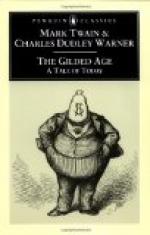It was melancholy, but Mr. Bigler was not a man to be crushed by one misfortune, or to lose his confidence in human nature, on one exhibition of apparent honesty. He was already on his feet again, or would be if Mr. Bolton could tide him over shoal water for ninety days.
“We’ve got something with money in it,” he explained to Mr. Bolton, “got hold of it by good luck. We’ve got the entire contract for Dobson’s Patent Pavement for the city of Mobile. See here.”
Mr. Bigler made some figures; contract so; much, cost of work and materials so much, profits so much. At the end of three months the city would owe the company three hundred and seventy-five thousand dollars-two hundred thousand of that would be profits. The whole job was worth at least a million to the company—it might be more. There could be no mistake in these figures; here was the contract, Mr. Bolton knew what materials were worth and what the labor would cost.
Mr. Bolton knew perfectly well from sore experience that there was always a mistake in figures when Bigler or Small made them, and he knew that he ought to send the fellow about his business. Instead of that, he let him talk.
They only wanted to raise fifty thousand dollars to carry on the contract—that expended they would have city bonds. Mr. Bolton said he hadn’t the money. But Bigler could raise it on his name. Mr. Bolton said he had no right to put his family to that risk. But the entire contract could be assigned to him—the security was ample—it was a fortune to him if it was forfeited. Besides Mr. Bigler had been unfortunate, he didn’t know where to look for the necessaries of life for his family. If he could only have one more chance, he was sure he could right himself. He begged for it.
And Mr. Bolton yielded. He could never refuse such appeals. If he had befriended a man once and been cheated by him, that man appeared to have a claim upon him forever. He shrank, however, from telling his wife what he had done on this occasion, for he knew that if any person was more odious than Small to his family it was Bigler.
“Philip tells me,” Mrs. Bolton said that evening, “that the man Bigler has been with thee again to-day. I hope thee will have nothing more to do with him.”
“He has been very unfortunate,” replied Mr. Bolton, uneasily.
“He is always unfortunate, and he is always getting thee into trouble. But thee didn’t listen to him again?”
“Well, mother, his family is in want, and I lent him my name—but I took ample security. The worst that can happen will be a little inconvenience.”
Mrs. Bolton looked grave and anxious, but she did not complain or remonstrate; she knew what a “little inconvenience” meant, but she knew there was no help for it. If Mr. Bolton had been on his way to market to buy a dinner for his family with the only dollar he had in the world in his pocket, he would have given it to a chance beggar who asked him for it. Mrs. Bolton only asked (and the question showed that she was no mere provident than her husband where her heart was interested),




